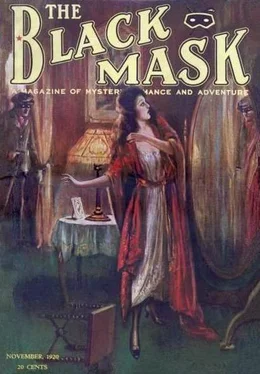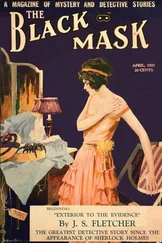Hamilton Craigie - The Black Mask Magazine (Vol. 2, No. 2 — November 1920)
Здесь есть возможность читать онлайн «Hamilton Craigie - The Black Mask Magazine (Vol. 2, No. 2 — November 1920)» весь текст электронной книги совершенно бесплатно (целиком полную версию без сокращений). В некоторых случаях можно слушать аудио, скачать через торрент в формате fb2 и присутствует краткое содержание. Город: New York, Год выпуска: 1920, Издательство: Pro-distributors Publishing Company, Жанр: Классический детектив, на английском языке. Описание произведения, (предисловие) а так же отзывы посетителей доступны на портале библиотеки ЛибКат.
- Название:The Black Mask Magazine (Vol. 2, No. 2 — November 1920)
- Автор:
- Издательство:Pro-distributors Publishing Company
- Жанр:
- Год:1920
- Город:New York
- ISBN:нет данных
- Рейтинг книги:5 / 5. Голосов: 1
-
Избранное:Добавить в избранное
- Отзывы:
-
Ваша оценка:
- 100
- 1
- 2
- 3
- 4
- 5
The Black Mask Magazine (Vol. 2, No. 2 — November 1920): краткое содержание, описание и аннотация
Предлагаем к чтению аннотацию, описание, краткое содержание или предисловие (зависит от того, что написал сам автор книги «The Black Mask Magazine (Vol. 2, No. 2 — November 1920)»). Если вы не нашли необходимую информацию о книге — напишите в комментариях, мы постараемся отыскать её.
The Black Mask Magazine (Vol. 2, No. 2 — November 1920) — читать онлайн бесплатно полную книгу (весь текст) целиком
Ниже представлен текст книги, разбитый по страницам. Система сохранения места последней прочитанной страницы, позволяет с удобством читать онлайн бесплатно книгу «The Black Mask Magazine (Vol. 2, No. 2 — November 1920)», без необходимости каждый раз заново искать на чём Вы остановились. Поставьте закладку, и сможете в любой момент перейти на страницу, на которой закончили чтение.
Интервал:
Закладка:
“I have it all right. It’s out at the flat.”
“Take her out there, Dorgan, and see if she’s telling the truth. I guess you will be able to tell. Use your discretion. I have another assignment for Mercer and Kelly.”
Dorgan and the girl walked out. On the way to the elevated station Jim noticed that she did not limp as she had the last time he had seen her and got her out of an affair in which he believed she really had been falsely accused.
“What’s happened, anyway?” he inquired.
“An operation, Mr. Dorgan,” she said, assuming an air of importance. “I’m somebody now. I could afford an operation. Doctor took a bone from my foot.” She stopped and held back her skirt so that he might see the result. Whereas the ankle had been enlarged and awkward before, it was now virtually of regular proportions.
“It’ll hurt your business, won’t it, Lizzie? You won’t be able to work on their sympathy any more.” Jim spoke with an air of camaraderie which sometimes obtains between hunter and hunted.
Lizzie did not answer.
At the flat she brought out the letter j and showed it to Dorgan. As she did 1 so her eyes became misty.
“The money was from my brother, George Harley,” she said throatily. “He died last summer.”
Dorgan looked at her quickly.
“Where?” he asked crisply.
“Down in Ohio somewhere, I guess. Here, read it.”
The letter, dated October 15, was from a Cincinnati bank and addressed to Elizabeth Harley. It merely stated that a client bank in Ohio had requested that a draft payable to her be forwarded by registered mail, the money being the estate that had been left by her brother, George Harley, who had died suddenly. She would be able, it added, to cash it at any bank.
Dorgan read it and his eyes glowed. “Lizzie, you remember you told me last summer that if you could do me a favor, you would?”
“Yes.”
“Well, can I have this letter for a while if I agree to return it to you?”
“And let me get run in without any proof of what I tell the bulls?”
“The chief will take my word that you’re on the square.”
“What do you want with it?”
“I can’t tell you that. But I’ll promise to return it. You know that I usually keep my promises.”
“All right, if you promise. But I want it back sure.”
“You’ll get it. By the way, what is your real name, Lizzie?”
“That’s it—Harley. That’s the truth, Jim.”
Dorgan that night requested and was granted three days leave without pay.
V.
Jim Dorgan was back in the office of Prosecutor Thornton at Rockland. He presented the letter he brought with him to the prosecutor, who read it over slowly.
“Are you content to let the case rest now, Bill?” Jim asked.
“No, I guess riot, Jim. Perhaps you had the right hunch after all. I don’t suppose that old Jacobsen would hardly have sent that money without the knowledge of the owner of the bank, who now happens to be Mrs. Lewis. We’ll go out and see her at once.”
The Dorgan car drove up to the Georgetown home of the widow. The prosecutor and Dorgan alighted and were met at the door by Mrs. Lewis. They were startled by her appearance — a woman aged years in months, her hair graying. She hesitated a moment, then opened the door to them. She asked them to be seated.
Thornton went to his subject at once. He produced the letter, passed it to her and asked if she understood what it meant. Mrs. Lewis paled to her hair and seemed to be on the point of denial. Then her manner changed suddenly and she was at ease.
“Yes, I know what it means, Mr. Thornton,” she said. “It—it was sent at my instruction. How did you get it?”
Thornton explained how Dorgan had come into possession of it, and recalled that Dorgan had been present last summer.
“Will you tell us what the letter means—how it all happened, Mrs. Lewis?” he added.
“Yes, I will be glad to. Do you know, Will,” she said, taking up his name of school days, “I am glad that you came today. Probably you will not believe it, but I am. I have thought very, very seriously of seeing you about it, and I would have in time. You do not know how a terrible secret like I have harbored can burn its way into one’s soul. I have been miserable, and yet I have not quite had the courage to make a clean breast of it. So I’m glad you’re here. At last I can tell.”
“Yes, Mrs. Lewis—Helen—I can understand,” Thornton assured her. “Tell us everything and you will feel better.”
“I had that money sent to Miss Harley,” she went on deliberately, “because her brother had told me she was a cripple; and he had expressed a hope that some time he might be able to supply her with funds for an operation. He had talked to me about her, and—and I thought I should do it. That money, Will, was stolen from the bank.”
Dorgan glanced toward Thornton victoriously. The prosecutor’s eyes showed plainly that he disliked to believe it.
“I’m going to tell you the whole truth, Will,” Mrs. Lewis was saying. “I’m going to start at the beginning and bare my soul. And if I am to blame for anything I am not going to ask for mercy. If I have done anything for which I should atone, I want to atone. I did not tell the whole truth last summer, but there seemed to be no other way out.
“You know, Will, about my marriage, and that Mr. Lewis was so much older. I didn’t think I should marry him, but my parents urged me to. And, I’ll be frank to say, Will, there did not seem to be another prospect for me. We were not happy; it was impossible for us to be. The difference in our ages was too great.
“Then Mr. Harley came here to work in the bank. From Columbus, it was. Mr. Lewis had inquired of a bank there for a competent man when his business got so heavy. I did not know anything much about Mr. Harley; neither did Mr. Lewis. But he was competent, likable and congenial—and he was young. There’s no use of hiding anything now. I think it all must have had its beginning when Mr. Lewis invited him to the house. We became good friends. You can see how it would be so—I had been cooped up so long without proper associates. He was only here a few times. Once at dinner he told Mr. Lewis and myself about his sister. He was very careful in his attentions to me at the house, but when I would go to the bank I saw in his eyes what any woman could not fail to see. I felt sort of guilty, but—but it thrilled me, too.
“Oh, I know it was not right, but I was so lonesome, so lonesome, Will. I was not in love with him, I am sure, or I would not have done what I did later. But I suppose his admiration enthralled me. Perhaps you will understand that—I can’t explain it more fully.” She paused and showed signs of giving away to her emotions.
Thornton and Dorgan gave her sympathetic attention and she proceeded.
“One day he said to me at the bank, — ‘You are very unhappy, Helen,’ and because it was true and because his voice and eyes were so tender, I began to cry. I was not used to tenderness. I hurried from the bank.
“The next day I had a note from him through the mail. It simply said, ‘Will you forgive me?’
“After that I stayed away from the bank, and one evening a week later he called me on the phone.
“ ‘Did you get my note?’ he asked.
“ ‘Yes,’ I said.
“ ‘What is the answer?’ he wanted to know.
“ ‘What could it be but yes,’ I told him.
“ ‘All right,’ he said. ‘Tonight.’
“That was all. The tenseness of his voice made me uneasy; the ‘Tonight’ worried me. But I told myself I had misunderstood it for ‘Good night.’
“Mr. Lewis had driven over to Winton to attend to some business or other. He said he might not be back until the next day. I suppose Mr. Harley knew it.
Читать дальшеИнтервал:
Закладка:
Похожие книги на «The Black Mask Magazine (Vol. 2, No. 2 — November 1920)»
Представляем Вашему вниманию похожие книги на «The Black Mask Magazine (Vol. 2, No. 2 — November 1920)» списком для выбора. Мы отобрали схожую по названию и смыслу литературу в надежде предоставить читателям больше вариантов отыскать новые, интересные, ещё непрочитанные произведения.
Обсуждение, отзывы о книге «The Black Mask Magazine (Vol. 2, No. 2 — November 1920)» и просто собственные мнения читателей. Оставьте ваши комментарии, напишите, что Вы думаете о произведении, его смысле или главных героях. Укажите что конкретно понравилось, а что нет, и почему Вы так считаете.












